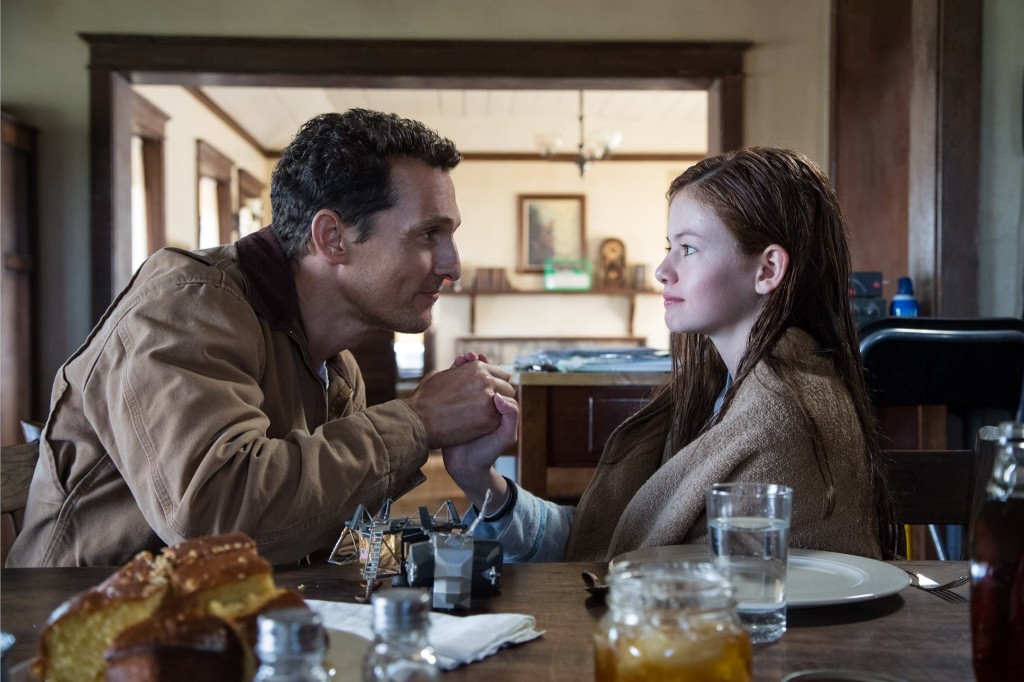Spoilers ahead
One of the themes that stands out in Director Christopher Nolan’s science fiction film “Interstellar” is the nature of altruism and self-sacrifice: how does our affection play out in our decisions? This can be cast in the perennial individual vs. society tension: which good takes precedent? If the absolutizing of either results in either, how do you hold the two in balance?
This tension in Interstellar is cast as family vs. species. Matthew McConaughey’s character, Cooper, is a family man; he is driven to help in the mission to find a habitable planet in order to save his family. Michael Caine’s character, Dr. Brand, is driven by survival of the species. This is his absolute so much so that he is willing to manufacture a massive fake program that appears to be trying to save people on Earth. Instead, it is used as bait to trick Cooper and others into the mission.
Dr. Mann, played by Matt Damon, is originally driven to save the species as well. Landing on a potentially habitable world only to find it harsh and inhospitable, he concludes that the quest to find a habitable planet is futile. Mann ultimately rejects the good of the species for his own good. He sabotages and even tries to kill Cooper in order to save himself. It is unclear what Mann hopes to gain by betraying his comrades and stealing their ship. Perhaps he wishes to spend the rest of his days as Earth dies to eat, drink and be merry; accepting that anything other than self-preservation is in vain.
But it is ultimately Cooper that is able to thread the needle through the tension of the individual and the species by his love of his family. It is love of particular individuals, his children, that guides him in his actions. Cooper is not moved by the “species” — just another word for abstract humanity — nor is he moved selfishly to save himself like Mann. Cooper’s love for his children moves him to find a solution to save the Earth, helping others, and his love for his children moves him to sacrifice himself for them. It is his love for them that allows him to sacrifice himself, which is ultimately the only way anyone can really save the species. Yet, Mann, supposedly seeing the good in survival of the species, is unable to do this because he loves no particular person. Supposedly this should make him more objective; he has no personal attachments to cloud his judgment. But it actually makes him incapable of his task: saving the world.
Brand and Mann crumble because their belief in abstractions is easily crushed as the tasks they face become more and more daunting. But Cooper is able to do the tasks necessary to save humanity because of his love for concrete particular individuals.
A passage from Dostoevsky’s novel The Brothers Karamazov comes to mind. A woman comes to the Elder Zosima, distraught that she is unable to love people unconditionally. Zosima goes on to describe a doctor he knew with the same problem. The doctor in Zosima’s recount said:
I love mankind, ‘he said, ‘but I amazed at myself. The more I love mankind in general, the less I love people in particular. That is individually, as separate persons. In my dreams, ‘he said, I often went so far as to think passionately of serving mankind, and, it may be, would really have gone to the cross for people if it were somehow suddenly necessary, and yet I am incapable of living in the same room with anyone even for two days, this I know from experience. As soon as someone is there, close to me, his personality oppresses my self-esteem and restricts my freedom. In twenty-four hours I can begin to hate even the best of men; one because he takes too long eating his dinner, another because he has a cold and keeps blowing his nose. I become the enemy of the people the moment they touch me,’ he said. “On the other hand, it has always happened the more I hate people individually, the more ardent becomes my love for humanity as a whole.”
Damon and Caine’s characters love mankind as a distant abstraction. An abstraction cannot drive someone to do the necessary self-sacrifice to save people. It will result in perversions as both Damon and Caine’s characters are unmoved by the death of an entire planet. Yet Cooper, who is motivated primarily by saving his family, is able to sacrifice his own life in order to save humanity. It seems like a paradox; we are able to take the actions necessary to save the whole by loving the part against the whole. It is nearly as a much a paradox as “Anyone who loves their life will lose it, while anyone who hates their life in this world will keep it for eternal life.”
No comments yet




